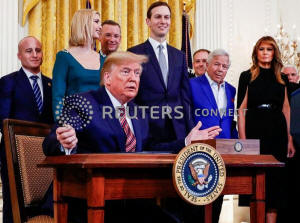Amid criticism, Trump signs order targeting anti-Semitism at
universities
 Send a link to a friend
Send a link to a friend
 [December 12, 2019]
WASHINGTON (Reuters) - U.S.
President Donald Trump signed an executive order on Wednesday to
prohibit federal funding for colleges and universities that allow
anti-Semitism, but the move drew some criticism for potentially limiting
free speech. [December 12, 2019]
WASHINGTON (Reuters) - U.S.
President Donald Trump signed an executive order on Wednesday to
prohibit federal funding for colleges and universities that allow
anti-Semitism, but the move drew some criticism for potentially limiting
free speech.
The order would extend protections against discrimination under the 1964
Civil Rights Act to people subjected to anti-Semitism on college
campuses.
"This is our message to universities: If you want to accept the
tremendous amount of federal dollars that you get every year, you must
reject anti-Semitism. It's very simple," Trump said during a Hanukkah
reception at the White House.
Title 6 of the Civil Rights Act prohibits discrimination on the basis of
race, color, and national origin in programs and activities receiving
federal financial assistance.
"This action makes clear that Title 6 of the Civil Rights Act, which
prohibits the federal funding of universities and other institutions
that engage in discrimination, applies to institutions that traffic in
anti-Semitic hate," Trump said.

J Street, a liberal Jewish-American lobbying group, criticized the
order.
"This executive order, like the stalled congressional legislation it is
based on, appears designed less to combat anti-Semitism than to have a
chilling effect on free speech and to crack down on campus critics of
Israel," it said in a statement.
The Anti-Defamation League, which tracks acts of racism, welcomed the
order.
[to top of second column]
|

White House senior advisors Ivanka Trump and Jared Kushner, New
England Patriots owner Robert Kraft and others stand behind U.S.
President Donald Trump after he signed an executive order on anti-semitism
during a Hanukkah reception in the East Room of the White House in
Washington, U.S., December 11, 2019. REUTERS/Tom Brenne

"In a climate of rising anti-Semitism, this executive order provides
valuable guidance on anti-Semitism, giving law enforcement and
campus officials an important additional tool to help identify and
fight this pernicious hate," Chief Executive Jonathan Greenblatt
said.
"It also reaffirms protection of Jews under Title VI without
infringing on First Amendment rights," he said in a statement.
The pro-Palestinian Boycott, Divestment, and Sanctions (BDS)
movement over Israelís policies towards Palestinians in the West
Bank and Gaza Strip has gained support among some university
students in recent years.
The movement, however, has received a bipartisan rebuke in the U.S.
Congress and many states have passed anti-BDS measures.
Some critics argue that participating in boycotts is protected by
Americans' constitutional right to free speech and that legitimate
criticism of Israeli policies could be stifled under the name of
combating anti-Semitism.
(Reporting by Jeff Mason and Steve Holland; Editing by Clarence
Fernandez)
[© 2019 Thomson Reuters. All rights
reserved.]
Copyright 2019 Reuters. All rights reserved. This material may not be published,
broadcast, rewritten or redistributed.
Thompson Reuters is solely responsible for this content. |